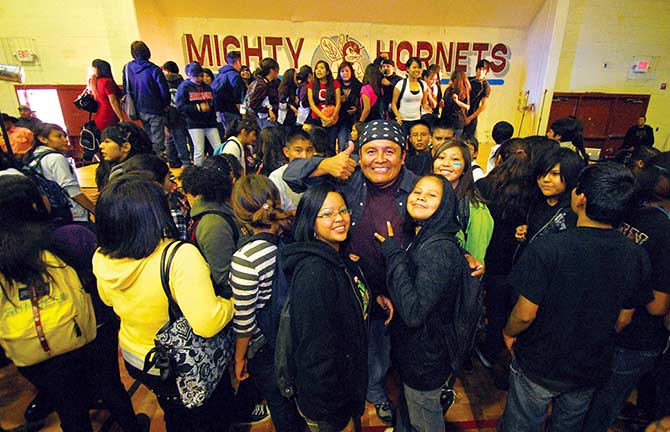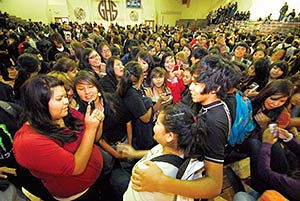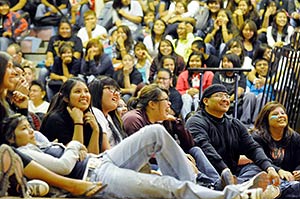Project Peace Train

(Special to the Times - Donovan Quintero)
Comedian Ernest Tsosie III poses with Ganado High students Monday during Project Peace Train.
Reaching youth through humor, entertainment
By Noel Lyn Smith
Navajo Times
GANADO, Ariz., Sept. 29, 2011


(Special to the Times - Donovan Quintero)
TOP: Martial artist Bronson Mitchell takes photographs with Ganado High students Monday during Project Peace Train.
BOTTOM: Comedian Pax Harvey, second from right, sits with Ganado High students at the first Project Peace Train on Monday.
Project Peace Train, a group of Native American entertainers dedicated to spreading the message about making the right choices in life, is a side project of Walking the Healing Path. Healing Path is the organization founded by father-son team Ernest Tsosie Jr. and John Tsosie, best known for their annual long-distance walk to end domestic violence.
Project Peace Train debuted Monday at Ganado High School, delivering a mixture of entertainment and serious discussion to students gathered inside the gymnasium.
They listened to the personal experiences of comedians Ernest Tsosie III, Pax Harvey, Tatanka Means and Adrianne Chalepah; singer Jay Begaye; and martial artists Reginald and Bronson Mitchell.
Each grew up in hard circumstances but was able to overcome the resulting personal problems and build a good life.
Chalepah touched on her days as a high school cheerleader in her home state of Oklahoma, and spoke about overcoming childhood experiences that included attending 10 schools by the 10th grade.
"My parents didn't do the best job raising me. They know that and they're working on it," she said. "You know what? I still made it."
Part of "making it" includes starting a business and developing her comedic talents. Along the way, Chalepah said she learned to be her own person and to stick to the choices she made.
"I would not be where I am today if I was not drug and alcohol free," she said. "Draw that line for yourself. If you want to be drug and alcohol free, do it. If you want to be domestic violence free, don't let anybody hurt you."
In between sets, masters of ceremonies Ernest Tsosie III and Harvey joked about family members, personal experiences, and life on the Navajo Nation.
Through the laughter, Tsosie and Harvey continued to mention the social issues that Project Peace Train is targeting.
"Suicide is a permanent solution to a temporary problem," Tsosie said, asking students to think about his statement.
Harvey reminded the teens that it is OK to be an individual and resist peer pressure to do what the group is doing when you know it's not right.
One of the more serious moments came when Ernest Tsosie Jr., John and Ernest III's father, spoke about the alcoholism and domestic violence that he had inflicted on his family.
As a parent, Tsosie said, it was hard to watch his boys head down the same path, with Ernest III abusing drugs and alcohol and John involved in domestic violence.
But taking a wrong turn did not mean they had to stay on the wrong path, and both sons found the courage to overcome their mistakes. Ernest III has been clean and sober for 10 years, while John sought counseling and grew into one of the Navajo Nation's leading advocates on the issue of domestic violence.
"What I'm telling you now is that my family survived domestic violence. It survived alcoholism. It survived the whole thing," said their father.
He also told students that the choices they make not only affect them but impact their families and their perception by the whole community.
"They will say, 'Who's his parents? Who are his grandparents? The ones that failed to raise him and to teach him,'" Tsosie said.
Throughout the presentation, the students seemed to connect to the message that each presenter was delivering while enjoying the show.
During Jay Begaye's performance, some students formed a large circle in the middle of the gymnasium floor and held hands, then moved to the rhythm of Begaye's drum.
Begaye said he was living in Canada when he heard about the high rate of suicide among First Nations teenagers, which led him to become involved with Project Peace Train as a way to combat that problem.
Father and son Reginald and Bronson Mitchell demonstrated jiu-jitsu to the delight and interest of the students.
Bronson, under the guidance of his father, has been studying martial arts since he was a little boy.
Since he knows that skill, Reginald said, he takes care not to misuse it.
"He doesn't go around pushing people around," Reginald said. "I always tell him to be responsible."
After the event, John Tsosie called the presentation a success.
Besides creating an open discussion about issues vital to Native teens, the members of Project Peace Train are working to deliver their message throughout the Navajo Nation and other Native lands.
The group would like to establish a partnership with President Ben Shelly and his office, since he has made youth a central priority in his administration. Tsosie said he met with Shelly in May about creating collaboration but has not heard further from the president's office since then.
Schools interested in hosting a Project Peace Train presentation are asked to contact John Tsosie on Facebook at www.facebook.com/projectpeacetrain or www.facebook.com/wthptoenddv.

